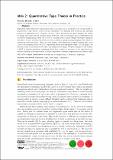Files in this item
Idris 2 : Quantitative Type Theory in practice
Item metadata
| dc.contributor.author | Brady, Edwin Charles | |
| dc.contributor.editor | Møller, Anders | |
| dc.contributor.editor | Sridharan, Manu | |
| dc.date.accessioned | 2021-07-14T14:30:14Z | |
| dc.date.available | 2021-07-14T14:30:14Z | |
| dc.date.issued | 2021-07-06 | |
| dc.identifier | 274212629 | |
| dc.identifier | 07daeee4-0629-4afb-aadb-7da20f1ba416 | |
| dc.identifier | 85115247995 | |
| dc.identifier.citation | Brady , E C 2021 , Idris 2 : Quantitative Type Theory in practice . in A Møller & M Sridharan (eds) , 35th European Conference on Object-Oriented Programming (ECOOP 2021) . , 11 , Leibniz International Proceedings in Informatics , Schloss Dagstuhl - Leibniz-Zentrum für Informatik GmbH , 35th European Conference on Object-Oriented Programming (ECOOP 2021) , Aarhus , Denmark , 11/07/21 . https://doi.org/10.4230/LIPIcs.ECOOP.2021.9 | en |
| dc.identifier.citation | conference | en |
| dc.identifier.isbn | 9783959771900 | |
| dc.identifier.issn | 1868-8969 | |
| dc.identifier.other | ORCID: /0000-0002-9734-367X/work/96817225 | |
| dc.identifier.uri | https://hdl.handle.net/10023/23560 | |
| dc.description | Funding: This work was funded by EPSRC grant EP/T007265/1. | en |
| dc.description.abstract | Dependent types allow us to express precisely what a function is intended to do. Recent work on Quantitative Type Theory (QTT) extends dependent type systems with linearity, also allowing precision in expressing when a function can run. This is promising, because it suggests the ability to design and reason about resource usage protocols, such as we might find in distributed and concurrent programming, where the state of a communication channel changes throughout program execution. As yet, however, there has not been a full-scale programming language with which to experiment with these ideas. Idris 2 is a new version of the dependently typed language Idris, with a new core language based on QTT, supporting linear and dependent types. In this paper, we introduce Idris 2, and describe how QTT has influenced its design. We give examples of the benefits of QTT in practice including: expressing which data is erased at run time, at the type level; and, resource tracking in the type system leading to type-safe concurrent programming with session types. | |
| dc.format.extent | 26 | |
| dc.format.extent | 939467 | |
| dc.language.iso | eng | |
| dc.publisher | Schloss Dagstuhl - Leibniz-Zentrum für Informatik GmbH | |
| dc.relation.ispartof | 35th European Conference on Object-Oriented Programming (ECOOP 2021) | en |
| dc.relation.ispartofseries | Leibniz International Proceedings in Informatics | en |
| dc.subject | Dependent types | en |
| dc.subject | Linear types | en |
| dc.subject | Concurrency | en |
| dc.subject | QA75 Electronic computers. Computer science | en |
| dc.subject | T-NDAS | en |
| dc.subject.lcc | QA75 | en |
| dc.title | Idris 2 : Quantitative Type Theory in practice | en |
| dc.type | Conference item | en |
| dc.contributor.institution | University of St Andrews. School of Computer Science | en |
| dc.contributor.institution | University of St Andrews. Centre for Interdisciplinary Research in Computational Algebra | en |
| dc.identifier.doi | 10.4230/LIPIcs.ECOOP.2021.9 |
This item appears in the following Collection(s)
Items in the St Andrews Research Repository are protected by copyright, with all rights reserved, unless otherwise indicated.

